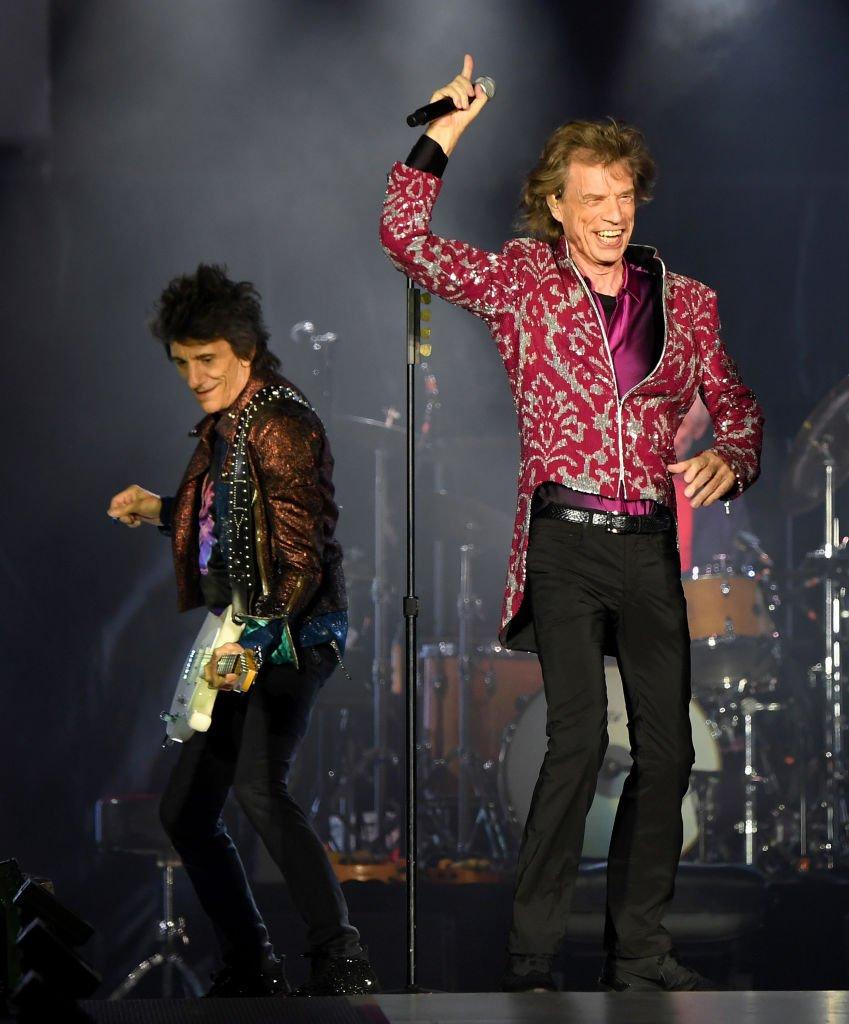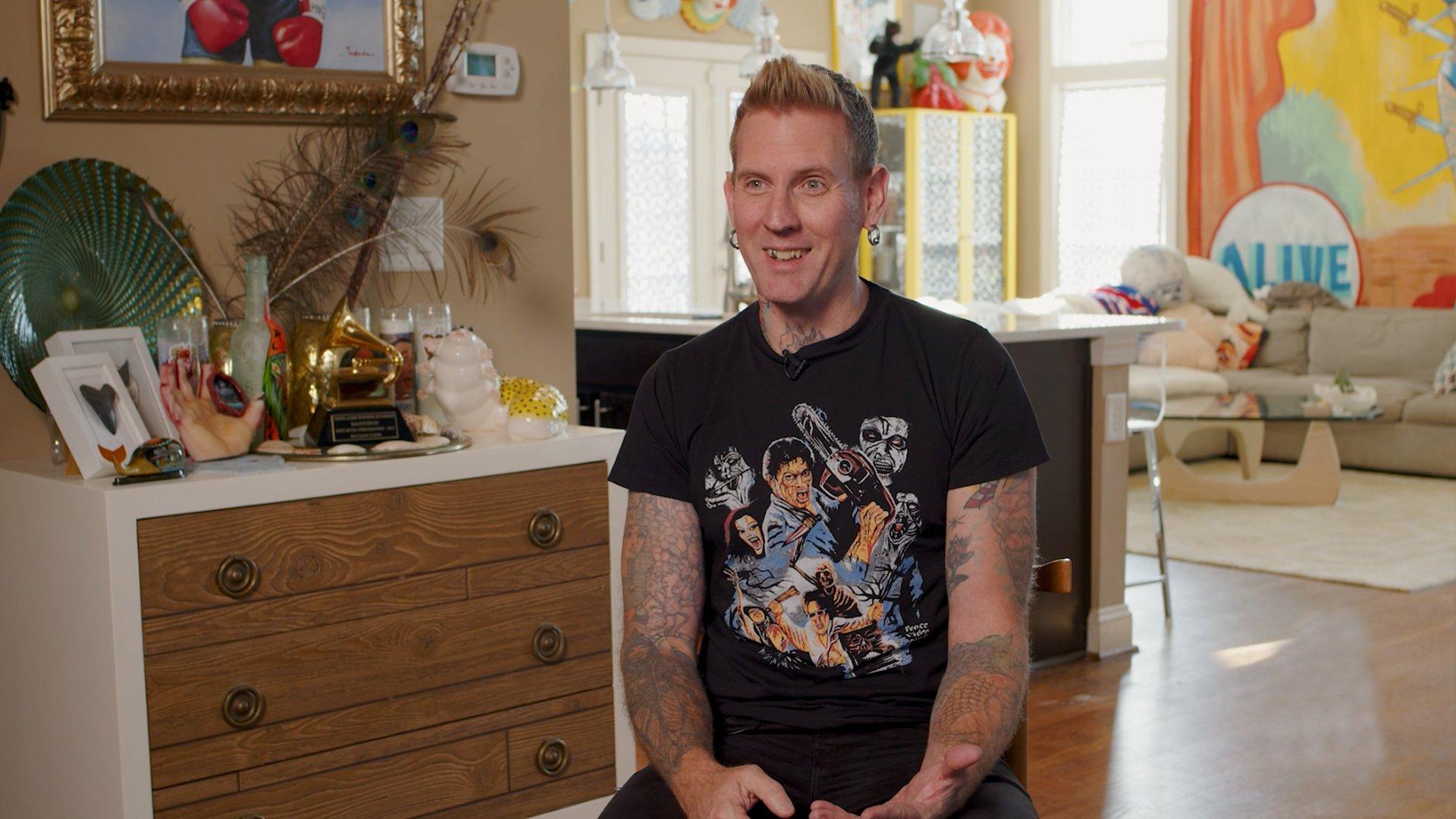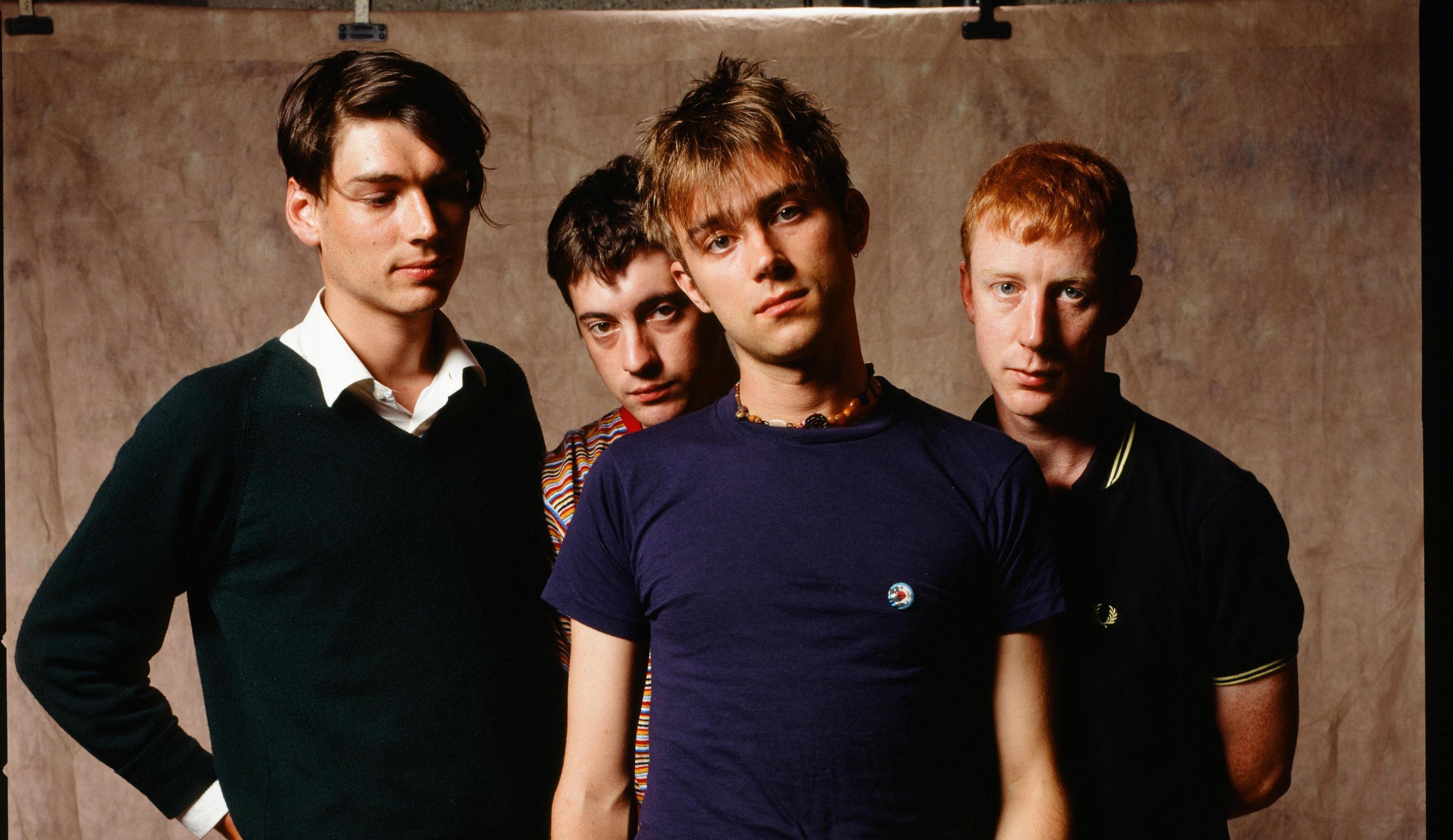Photo: Kevin Mazur/Getty Images

Ronnie Wood and Mick Jagger of The Rolling Stones perform in 2019
news
The Rolling Stones Announce 2020 North American "No Filter" Tour Dates
The newly announced 2020 tour dates, running May 8 through July 9, are the latest installment in the band's long-running No Filter trek
Rock icons and three-time GRAMMY winners Rolling Stones have today (Feb. 6) announced a North American tour, which will kick off this spring and run through the summer. The 15-date No Filter Tour, running May 8 through July 9, will take the legendary band to major stadiums across the U.S., with one date in Vancouver, Canada, confirmed so far.
<style>.embed-container { position: relative; padding-bottom: 56.25%; height: 0; overflow: hidden; max-width: 100%; } .embed-container iframe, .embed-container object, .embed-container embed { position: absolute; top: 0; left: 0; width: 100%; height: 100%; }</style><div class='embed-container'><iframe src='https://www.youtube.com/embed//Vm7TB6tzGB8' frameborder='0' allowfullscreen></iframe></div>
The newly announced 2020 tour dates are the latest installment in the Stones' long-running No Filter trek, which originally launched in Europe in September 2017 and followed with an additional European run in 2018, the latter of which featured support from GRAMMY nominees Liam Gallagher, Florence + The Machine, Richard Ashcroft, James Bay and others. The first North American installment of the No Filter Tour, a 17-date trek last summer, grossed more than $177 million, according to Rolling Stone magazine. The latter tour was originally scheduled to launch last April, but was rescheduled due to frontman Mick Jagger's heart surgery.
Read: Guns N' Roses Announce North American Tour Dates
Last year, Rolling Stones reissued their 1969 album, Let It Bleed, in celebration of its 50th anniversary and performed at the New Orleans Jazz & Heritage Festival.
Tickets for Rolling Stones' 2020 North American No Filter Tour go on sale Friday, Feb. 14, at 10 a.m. local time. For more information and for the full tour routing, visit the band's official website.

Photo: Courtesy of Brann Dailor
video
Where Do You Keep Your GRAMMY?: Mastodon’s Brann Dailor Shares The Story Of Their Best Metal Performance Track, “Sultan’s Curse”
Mastodon drummer and singer Brann Dailor reveals the metaphor behind the track that snagged him his first golden gramophone, “Sultan’s Curse,” and how winning a GRAMMY was the “American Dream” of his career.
Mastodon's drummer and singer Brann Dailor assures you he did not purchase his shiny golden gramophone at his local shopping mall.
“I won that! I’m telling you. It’s a major award,” he says in the latest episode of Where Do You Keep Your GRAMMY?
The metal musician won his first GRAMMY award for Best Metal Performance for Mastodon's “Sultan’s Curse” at the 2018 GRAMMYs.
“‘Sultan’s Curse’ was the jumping-off point for the whole theme of the album,” he explains. “The protagonist is walking alone in the desert, and the elements have been cursed by a Sultan.”
It’s a metaphor for illness — during the creation of the album, the band’s guitarist Bill Kelliher’s mother had been diagnosed with a brain tumor and bassist Troy Sanders’s wife was battling breast cancer.
For the band, the GRAMMY award represented their version of the American Dream and culmination of their career work. Even if Mastodon didn’t win the award, Dailor was happy to be in the room: “We felt like we weren't supposed to be there in the first place! But it's an incredible moment when they actually read your name."
Press play on the video above to learn the complete story behind Brann Dailor's award for Best Metal Performance, and check back to GRAMMY.com for more new episodes of Where Do You Keep Your GRAMMY?

Photo: Koh Hasebe/Shinko Music/Getty Images
list
7 Ways Blur's 'Parklife' Served As The Genesis Of Britpop
On the heels of their Coachella return, Blur celebrates the 30th anniversary of their opus, 'Parklife,' on April 25. Take a look at how the album helped bring Britpop to the mainstream.
In April 1993, journalist Stuart Maconie coined the term Britpop for a Select magazine article celebrating the UK's fight back against the dominance of American rock. Remarkably, London four-piece Blur weren't even mentioned in the story. And yet, frontman Damon Albarn, guitarist Graham Coxon, bassist Alex James, and drummer Dave Rowntree would provide the catalyst for the scene's mainstream breakthrough.
Just a year later, Blur released what many consider to be Britpop's defining statement. Parklife served as a colorful, vibrant, and incredibly infectious love letter to all things Anglocentric, drawing upon the nation's great cultural heritage while also foreshadowing what was to come. And it instantly struck a chord with homegrown audiences desperate for guitar music that wasn't drowning in abject misery, and better reflected their day-to-day lives.
Remarkably, Albarn had predicted Parklife's success four years earlier. As he declared to music writer David Cavanagh in 1990, "When our third album comes out, our place as the quintessential English band of the '90s will be assured. That is a simple statement of fact."
Three decades after its game-changing release, here's a look at how Parklife forever changed both Blur's career trajectory and the history of British rock.
It Kickstarted Britpop's Greatest Rivalry
In one of those great rock coincidences, Blur's third LP hit the shelves just 24 hours after "Supersonic" gave a then-relative unknown Manchester outfit named Oasis their first ever UK Top 40 single. And the two bands would remain intertwined (perhaps begrudgingly so) from then on, culminating in the most high-profile chart battle in British music history.
You could argue that Oasis' Noel Gallagher threw the first stone, describing Parklife as "Southern England personified" in a manner that suggested it wasn't exactly complimentary. And according to his manager Alan McGee, Definitely Maybe cut "Digsy's Dinner" was written as a deliberate "piss-take of Blur."
An increasingly bitter war of words then broke out in the summer of 1995 as the "Country House" versus "Roll With It" war swept the nation. Blur emerged victorious, although Oasis had the last laugh when (What's The Story) Morning Glory spent 10 weeks atop the UK album chart.
It Brought Storytelling Back To Indie Pop
Heavily inspired by Martin Amis novel London Fields, Parklife was inhabited by a cast of intriguing fictional characters, essentially doubling up as a series of short stories. "Tracy Jacks," for example, is about a golf-obsessed civil servant who ends up getting arrested for public indecency before bulldozing his own house.
"Magic America" is the tale of Bill Barret, a Brit who commits to a life of excess during a Stateside holiday ("Took a cab to the shopping malls/ Bought and ate until he could do neither anymore"), while "Clover Over Dover" explores the mindset of a manipulative boyfriend threatening to jumping off the titular white cliffs.
Over the following 18 months, everything from Pulp's "Common People" and Space's "Neighbourhood" to Supergrass' "Caught by the Fuzz" and The Boo Radleys' "It's Lulu" were combining classic British guitar pop with witty Mike Leigh-esque vignettes of modern life.
It Originated The Big Indie Ballad
Dramatic ballads aren't necessarily the first thing that come to mind with Parklife, a record famed for its jaunty, "knees-up Mother Brown" ditties. But it boasts two examples: "To The End," an alternate Bond theme featuring a burst of Gallic flair from Stereolab's Laetitia Sadler, and the swoonsome "This Is A Low." Turns out the "mystical lager-eater" the record was designed to embody could also get a little vulnerable from time to time.
This appeared to give all of their laddish peers some pause for thought. Oasis, the most fervent advocates of the "cigarettes and alcohol" lifestyle, later scored their biggest hit with acoustic ballad "Wonderwall." And bands including Cast ("Walkaway"), Shed Seven ("Chasing Rainbows") and Menswear ("Being Brave") all enjoyed UK hits revealing their softer sides. No doubt Coldplay, Travis, and every other sensitive post-Britpop outfit that emerged in the late 1990s were taking notes, too.
It Paid Respect To The Greats
The Britpop scene was renowned for its slavish devotion to the first time British guitar bands ruled the airwaves, the Swinging Sixties. Oasis freely admitted they modeled themselves on the Beatles, while the likes of Ocean Colour Scene, Kula Shaker and The Paul Weller all released albums that sounded like they'd been discovered in a vintage record shop.
And while Blur would later distance themselves from the past with a sense of invention (which Albarn would also parlay into his various side projects, including the virtual band Gorillaz), they were more than happy to get all nostalgic on Parklife. See "Far Out," their only track to feature James on lead vocal, which resembled the trippy psychedelia of Pink Floyd in their Syd Barrett era, and the Sgt. Pepper-esque brassy instrumental "The Debt Collector," while there are also echoes of the Walker Brothers, The Kinks, and Small Faces. Suddenly, retro was the new cool.
It Turned Blur Into Britain's Biggest Guitar Band
The UK Top 10 success of 1991's "There's No Other Way" proved to be something of a false start for Blur, with the band soon falling by the wayside like every other baggy pop outfit that emerged at the turn of the decade. "Popscene," the 1992 single intended to revolutionize both their career and British guitar music in general, stalled at No. 32, while 1993 sophomore Modern Life is Rubbish sold just 40,000 copies.
But Parklife single-handedly turned Blur into Britain's biggest guitar band, reaching No. 1 in their homeland, spending 82 weeks in the Top 40, and eventually becoming a million-seller. It went on to pick up four BRITs, a Mercury Prize nomination, and has been recognized as an all-time great by Spin, Pitchfork, and Rolling Stone. Further proof of its glowing reputation came in 2009 when Royal Mail selected it as one of 10 albums worthy of commemorating on a postage stamp.
It Spawned A String Of Classic Singles
Parklife's campaign was kicked off in March 1994 with "Girls and Boys," a glorious dissection of British vacationers — which, surprisingly in the days when genre-hopping was frowned upon — evoked the '80s synth-pop of Duran Duran and Pet Shop Boys. Rowntree was even replaced by a drum machine, not that he particularly minded, luckily.
This indie floorfiller was followed up by the hugely underrated "To The End" and then the much-quoted title track. Everything about "Parklife" the song is larger than life: the Cockney geezer narration from Quadrophenia's Phil Daniels, the festival-friendly sing-along chorus, and the brightly colored video in which James — perhaps tipping his hat to Queen's "I Want to Break Free" -– donned soap opera drag. But fourth release "End of a Century," a melancholic tale of domestic drudgery complete with mournful trombone solo, once again proved there was a depth beyond their cheeky chappy personas.
It Made Brits Proud To Be British Again
Unable to connect with the oppressive angst and flannel shirts of the grunge movement that had plagued their first major North American tour in 1992, Blur first started to embrace their inherent Englishness on the following year's Modern Life is Rubbish. Unfortunately, this throwback to the original British Invasion was met with a resounding shrug of the shoulders on both sides of the Atlantic.
Undeterred, however, the band doubled down on all things Anglocentric on its follow-up, from its original title of London, to its greyhound racing cover art, to its celebrations of bank holidays, Club 18-30 holidays, and shipping forecasts. This time around, they managed to capture the zeitgeist (at home, at least), as the rise of New Labour and the forthcoming hosting of Euro '96 made everyone proud to be British again. Within 12 months, the UK charts were littered with homegrown guitar bands selling the idea of the English dream — and it all started with Parklife.

Photo: Adali Schell
list
How Andrew Watt Became Rock's Big Producer: His Work With Paul McCartney, Ozzy Osbourne, Pearl Jam, & More
Andrew Watt cut his teeth with pop phenoms, but lately, the 2021 Producer Of The Year winner has been in demand among rockers — from the Rolling Stones and Blink-182 to Elton John.
While in a studio, Andrew Watt bounces off the walls. Just ask Mick Jagger, who once had to gently tell the 33-year-old, "Look, I can deal with this, but when you meet Ronnie and Keith, you have to dial it down a little bit."
Or ask Pearl Jam's Stone Gossard. "He really got the best out of [drummer] Matt [Cameron] just by being excited — literally jumping up and down and pumping his fist and running around," he tells GRAMMY.com.
As Watt's hot streak has burned on, reams have rightly been written about his ability to take a legacy act, reconnect them with their essence, and put a battery in their back. His efficacy can be seen at Music's Biggest Night: Ozzy Osbourne's Patient Number 9 won Best Rock Album at the 2023 GRAMMYs. At the last ceremony, the Rolling Stones were nominated for Best Rock Song, for Hackney Diamonds' opener "Angry."
On Pearl Jam's return to form, Dark Matter, due out April 19. Who was behind the desk? Take a wild guess.
"You want to see them live more than you want to listen to their albums, and they have the ability to look at each other and play and follow each other. I don't like my rock music any other way, as a listener," Watt tells GRAMMY.com. "All my favorite records are made like that — of people speeding up, slowing down, playing longer than they should."
As such, Watt had a lightbulb moment: to not record any demos, and have them write together in the room. "They're all playing different stuff, and it makes up what Pearl Jam is, and singer Eddie [Vedder] rides it like a wave."
If you're more of a pop listener, there's tons of Watt for you — he's worked with Justin Bieber ("Hit the Ground" from Purpose), Lana Del Rey ("Doin' Time" from Norman F—ing Rockwell) and much more. Read on for a breakdown of big name rockers who have worked with Andrew Watt.
Pearl Jam / Eddie Vedder
Watt didn't just produce Dark Matter; he also helmed Vedder's well-received third solo album, Earthling, from 2022. Watt plays guitar in Vedder's live backing band, known as the Earthlings — which also includes Josh Klinghoffer, who replaced John Frusciante in the Red Hot Chili Peppers for a stint.
The Rolling Stones
Dark Matter was a comeback for Pearl Jam, but Hackney Diamonds was really a comeback for the Stones. While it had a hater or two, the overwhelming consensus was that it was the Stones' best album in decades — maybe even since 1978's Some Girls.
"I hope what makes it fresh and modern comes down to the way it's mixed, with focus on low end and making sure the drums are big," Watt, who wore a different Stones shirt every day in the studio, has said about Hackney Diamonds. "But the record is recorded like a Stones album."
Where there are modern rock flourishes on Hackney Diamonds, "There's no click tracks. There's no gridding. There's no computer editing," he continued. "This s— is performed live and it speeds up and slows down. It's made to the f—ing heartbeat connection of Mick Jagger, Keith Richards, Ronnie Wood and Steve Jordan.
"And Charlie," Watt added, tipping a hat to Watts, who played on Hackney Diamonds but died before it came out. "When Charlie's on it."
Iggy Pop
Ever since he first picked up a mic and removed his shirt, the snapping junkyard dog of the Stooges has stayed relevant — as far as indie, alternative and punk music has been concerned.
But aside from bright spots like 2016's Josh Homme-produced Post Pop Depression, his late-career output has felt occasionally indulgent and enervated. The 11 songs on 2023's eclectic Watt-produced Every Loser, on the other hand, slap you in the face in 11 different ways.
"We would jam and make tracks and send them to Iggy, and he would like 'em and write to them or wouldn't like them and we'd do something else," Watt told Billboard. "It was very low pressure. We just kept making music until we felt like we had an album." (And as with Pearl Jam and Vedder's Earthlings band, Watt has rocked out onstage with Pop.
Ozzy Osbourne
You dropped your crown, O Prince of Darkness. When he hooked up with Watt, the original Black Sabbath frontman hadn't released any solo music since 2010's Scream; in 2017, Sabbath finally said goodbye after 49 years and 10 (!) singers.
On 2020's Ordinary Man and 2022's Patient Number 9, Watt reenergized Ozzy; even when he sounds his age, Ozz sounds resolute, defiant, spitting in the face of the Reaper. (A bittersweet aside: the late Taylor Hawkins appears on Patient Number 9, which was written and recorded in just four days.)
Maroon 5
Yeah, yeah, they're more of a pop-rock band, but they have guitars, bass and drums. (And if you're the type of rock fan who's neutral or hostile to the 5, you shouldn't be; Songs About Jane slaps.)
At any rate, Watt co-produced "Can't Leave You Alone," featuring Juice WRLD, from 2021's Jordi. Critics disparaged the album, but showed Watt's facility straddling the pop and rock worlds.
5 Seconds of Summer
When it comes to Andrew Watt, the Sydney pop-rockers — slightly more on the rock end than Maroon 5 and their ilk — are repeat customers. He produced a number of tracks for 5 Seconds of Summer, which spanned 2018's Youngblood, 2020's Calm and 2022's 5SOS5.
Regarding the former: Watt has cited Youngblood as one of the defining recording experiences of his life.
"I had started working with 5 Seconds of Summer, and a lot of people looked at them as a boy band, but they're not," Watt told Guitar Player. "They're all incredible musicians. They can all play every instrument. They love rock music. They can harmonize like skyrockets in flight. They just were making the wrong kind of music."
So Watt showed 5 Seconds of Summer a number of mainstays of the rock era, like Tears for Fears and the Police. The rest, as they say, is history.
Elton John
A year after Britney Spears was unshackled from her highly controversial conservatorship, it was time for a victory lap with the God of Glitter. What resulted was a curious little bauble, which became a megahit: "Hold Me Closer," a spin on "Tiny Dancer," "The One" and "Don't Go Breaking My Heart" that briefly launched Spears back into the stratosphere.
"Britney came in and she knew what she wanted to do," Watt recalled to The L.A. Times. "We sped up the song a little bit and she sang the verses in her falsetto, which harkens back to 'Toxic.' She was having a blast."
Blink-182
Watt has also worked with pop/punk heroes Blink-182 — but not after Tom DeLonge made his grand return. He produced "I Really Wish I Hated You" from 2019's Nine, back when Matt Skiba was in the band.
Where in the rock world will this tender-aged superproducer strike next? Watt knows.
Songbook: The Rolling Stones' Seven-Decade Journey To Hackney Diamonds

Photo: Todd Owyoung/NBC via Getty Images
interview
On 'Little Rope,' Sleater-Kinney Still Wear Their Hearts On Their Sleeves
Sleater-Kinney's latest album delves into profound vulnerability, crafted in the wake of personal loss and global upheaval. 'Little Rope' showcases the band's enduring spirit, close friendship, and the approach that's kept them relevant over time.
Using lively, raw instrumentals as a vehicle for emotional catharsis, Sleater-Kinney’s Little Rope takes the lead as one of their most vulnerable projects to date.
The "Dig Me Out" singers approach their 11th studio album with a fresh perspective, influenced by their experiences during the pandemic. Despite the departure of drummer Janet Weiss in 2019, the band maintains their iconic post-riot grrrl take on rock music. Carrie Brownstein and Corin Tucker infuse Little Rope with reflective lyrics and raw energy, mirroring their personal growth and resilience.
While working on the album one day, Brownstein received a call with news that nobody ever wants to hear, nor expects. She had been informed that her mother and stepfather had been involved in a fatal car accident while on vacation in Italy. Faced with grief and a sense of unfamiliarity, the band turned to something that always brought them comfort: making music. Little Rope was born.
Despite such a tragic, major life change and trying to make it through a global pandemic, Sleater-Kinney’s motive remains consistent.
"We hope to find people where they're at," Tucker explains to GRAMMY.com. "And it seems like we have, in each stage of someone’s life."
After hosting a GRAMMY U SoundChecks event with the Pacific Northwest Chapter of GRAMMY U, Sleater-Kinney sat down with GRAMMY.com to talk about their perspective on the ever-changing industry and the legendary bands they pull inspiration from.
This interview has been edited for clarity.
It has been almost 30 years since you all released your first album. In what ways has Sleater-Kinney changed since then and what has stayed consistent?
Corin Tucker: We still try to write songs that are emotional and that reach people. Our songwriting has developed over the years and I think we have different methodologies for writing. But, really the most important point of a song is that it makes people feel something. We still try to judge what we do by the same metric as we did 30 years ago.
Carrie Brownstein: One thing we set out to do is to have a unique sound and I think we created a sonic language with each other that we've tried to maintain, but also push the narrative forward and challenge ourselves with each album. That's been consistent from the beginning, we never — even in the early years — wanted one album to sound like the last one. Things change and the industry changes. We just try to stay true to ourselves, but also adapt.
Are there any of your early projects that you feel still resonate to this day?
Corin Tucker: The funny thing about streaming is that people are finding some of those older songs and really getting into them. We found out at the end of last year that people were really into one or two songs off of our very first self-titled record. A really nice thing about having your music available digitally is that it's available to everyone all over the world.
Path of Wellness (2021) was self-produced, as it was made during the peak of the COVID-19 pandemic and Little Rope (2024) was produced by GRAMMY-winning producer John Congleton. What was it like going from a self-produced project to having John on the next project? Was there a certain reason you chose to work with John?
Carrie Brownstein: Self-producing for us was very anomalous. We've always worked with producers and one of the reasons is to just have an outside perspective — somebody to come in and be the tiebreaker or to just bounce ideas off of. So, it was kind of a no-brainer to return to a producer after the solitary of the pandemic.
We have always been fans of John Congleton's work. We come from similar backgrounds and have been in talks to work with him for a while. Fortunately for this album, it worked out and we felt like these songs would be really well served by his productions.
Could you tell us a little bit about your dynamic as a music duo? When writing songs, do you both try to work on them 50/50 or is it on-and-off, where one of you may take the lead for certain songs? And what was this collaboration like specifically with Little Rope?
Corin Tucker: Our goal is always to make the song as strong as it can be. We’ve worked together long enough to know that that's the most important thing. Sometimes a song is more an idea of one or the other, and you need to wait until they’ve fleshed it out to come in with your parts. We have a bunch of different modalities and we just try to keep the conversation going. It's a lot about communication – it's an ongoing constant conversation between the two of us on where the song is at and what we think it might need.
Can you share any standout memories or experiences from when you were writing Little Rope?
Carrie Brownstein: My friend has an apartment in Downtown Portland and he was out of town. So, he let us use the space as a writing studio. And neither of us live in Downtown Portland, so it was interesting to be in this highrise in Portland looking out over the city — sort of being in conversation with the city and changing the landscape in which we were writing was nice to have.
As Pacific Northwest natives, how do you see your Pacific Northwest roots stick out in your music?
Corin Tucker: A lot of the sounds from the historic bands you can hear in our music. You can hear Nirvana, you can hear the Fastbacks, so you can hear so many of those Pacific Northwest musicians. They were bands that we grew up with and bands that we still try and emulate with what we do.
I feel like a good number of Sleater-Kinney fans have stayed fans and grown with you all over the years. What about your music and your brand do you think resonates with people even in different stages of their lives, and how did you foster this dynamic?
Carrie Brownstein: Sleater-Kinney’s a very earnest band. We wear our hearts on our sleeves and I think our audience appreciates that rawness and vulnerability. It's emotional music.
We have a lot of younger and newer fans. I think they relate to the emotionality and the honesty in the music, so that’s what we try to stick with.
You have said that The Showbox is one of your favorite venues to play at in Seattle. How does it feel being back at The Showbox for two sold-out shows?
Carrie Brownstein: We really enjoy the intimacy of a smaller venue, allowing the fans to get a little closer to the stage and feeling more connected with them. It's just nice to feel a sense of history, a through line with our career and our relationship with the city. We're really excited to be here.
I’m curious to know how your fans reacted to Little Rope. Have you noticed any common reactions to the project? Or any particular responses that have stood out?
Corin Tucker: People really relate to the emotion in the music. We've gotten a lot of people saying that it helped them through a hard time. Having that impact on people is pretty special when they feel like it's okay to be emotional and process things with music.
Lastly, you have the rest of your international tour to go, but what else is coming up for Sleater-Kinney?
Corin Tucker: We're very excited to play shows internationally. There may be some cool stuff coming up that maybe hasn't been announced yet, but we're looking forward to more touring.
Carrie Brownstein: For an album cycle, it's almost two years and so, for the most part it will be, it'll be touring and then we'll write something else.
